Commercial Law (BULAW1503) Assignment: Semester 2, 2019, Analysis
VerifiedAdded on 2022/09/18
|11
|2758
|27
Homework Assignment
AI Summary
This assignment solution addresses a Commercial Law problem (BULAW1503), focusing on agency law principles and the implications of apparent and implied authority. The solution analyzes a scenario involving a family lawyer, Mike, and his former firm, Leegall Lore & Associates (LLA), and a charter company, Glitz Cruisers. The analysis examines whether LLA is liable for Mike's actions after he leaves the firm, considering his implied and apparent authority. The solution also explores the recommendations from the Royal Commission into Misconduct in the Banking, Superannuation, and Financial Services Industry, specifically those related to the insurance sector. It discusses the recommendations concerning the duty of disclosure, unfair contract terms, and the prohibition of hawking insurance products. The assignment uses case law, including Watteau v Fenwick and Freeman & Lockyer v Buckhurst Park Properties, to support its arguments and provides a comprehensive legal analysis.
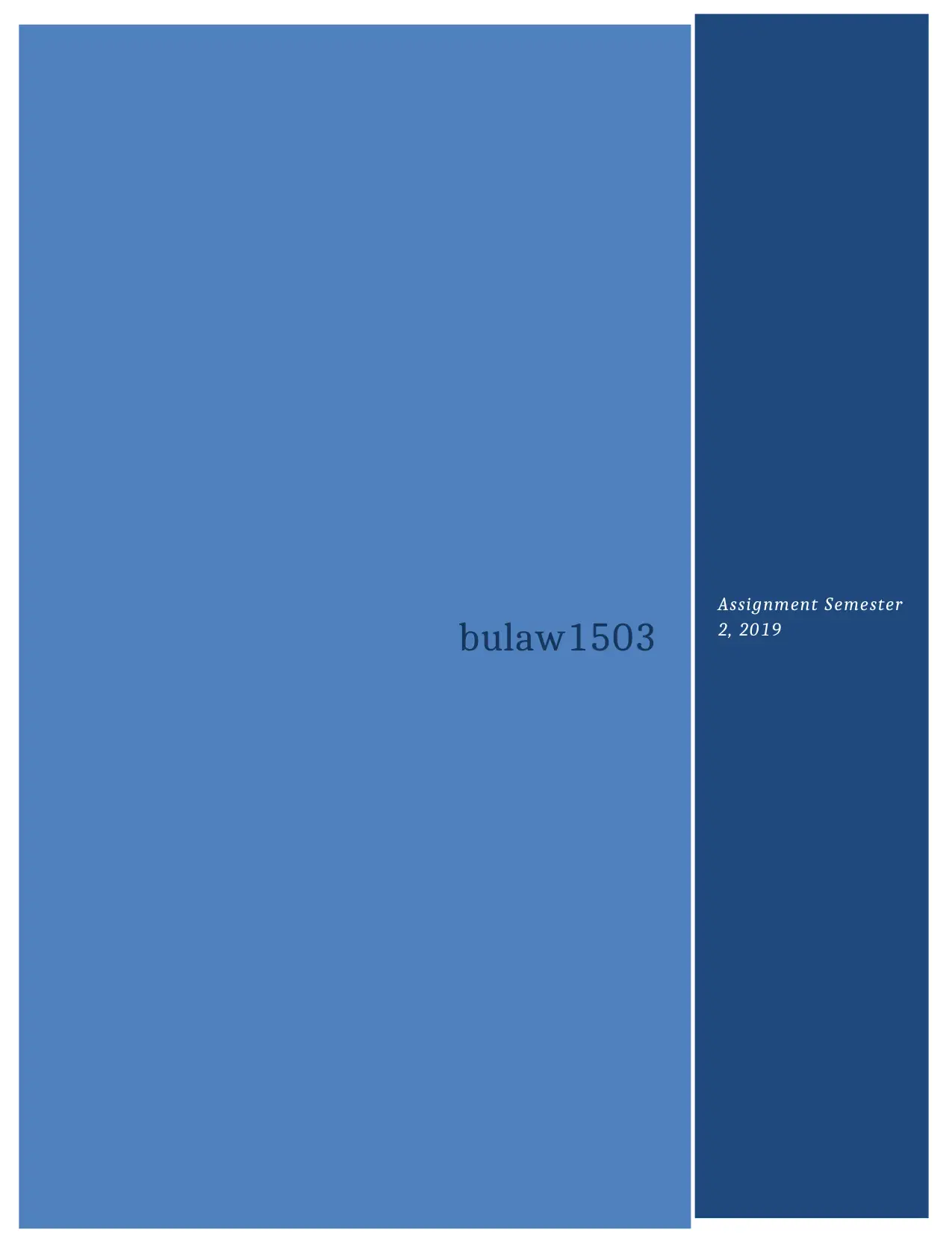
Running Head: BUSINESS AND CORPORATION LAW 0
bulaw1503
Assignment Semester
2, 2019
bulaw1503
Assignment Semester
2, 2019
Paraphrase This Document
Need a fresh take? Get an instant paraphrase of this document with our AI Paraphraser
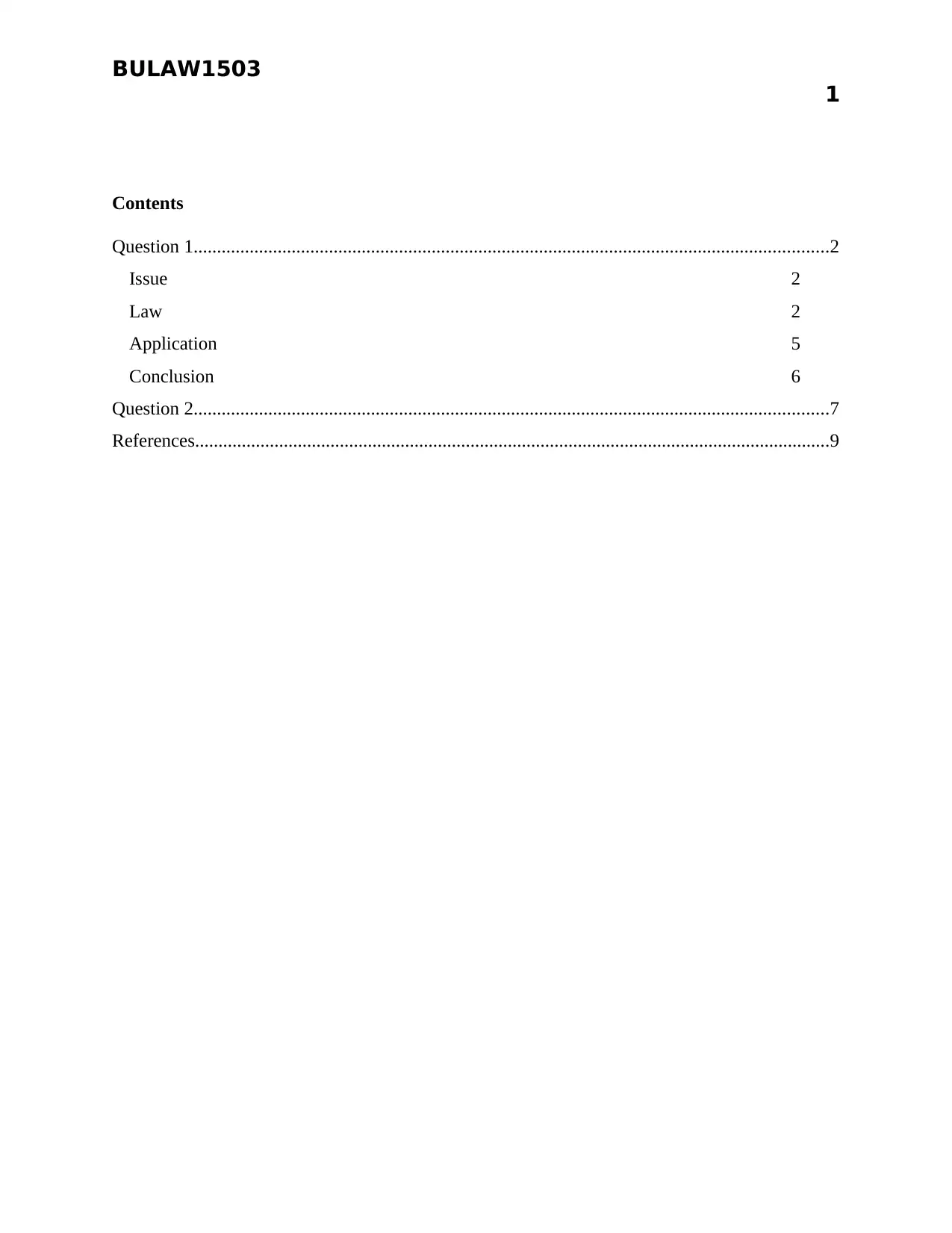
BULAW1503
1
Contents
Question 1........................................................................................................................................2
Issue 2
Law 2
Application 5
Conclusion 6
Question 2........................................................................................................................................7
References........................................................................................................................................9
1
Contents
Question 1........................................................................................................................................2
Issue 2
Law 2
Application 5
Conclusion 6
Question 2........................................................................................................................................7
References........................................................................................................................................9
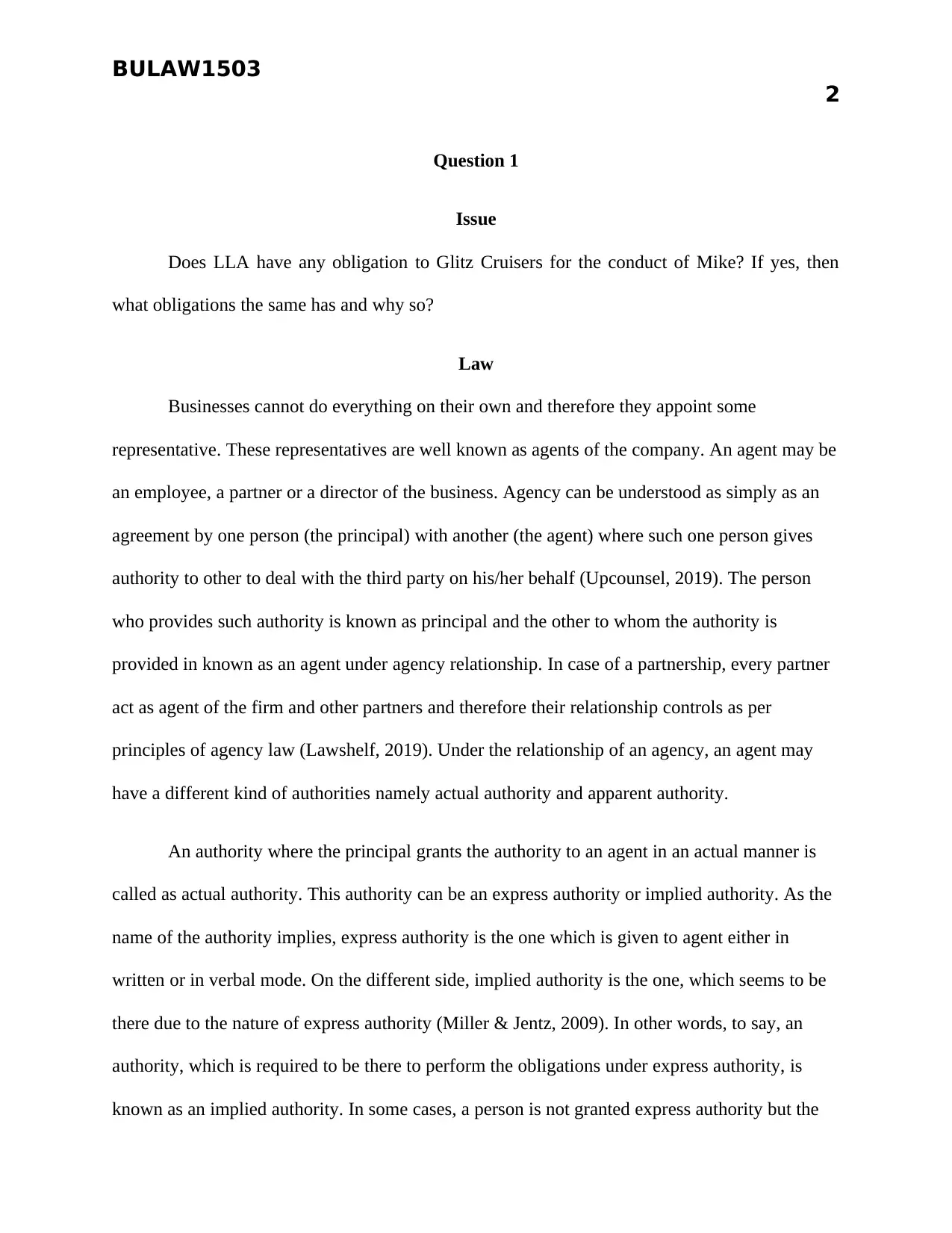
BULAW1503
2
Question 1
Issue
Does LLA have any obligation to Glitz Cruisers for the conduct of Mike? If yes, then
what obligations the same has and why so?
Law
Businesses cannot do everything on their own and therefore they appoint some
representative. These representatives are well known as agents of the company. An agent may be
an employee, a partner or a director of the business. Agency can be understood as simply as an
agreement by one person (the principal) with another (the agent) where such one person gives
authority to other to deal with the third party on his/her behalf (Upcounsel, 2019). The person
who provides such authority is known as principal and the other to whom the authority is
provided in known as an agent under agency relationship. In case of a partnership, every partner
act as agent of the firm and other partners and therefore their relationship controls as per
principles of agency law (Lawshelf, 2019). Under the relationship of an agency, an agent may
have a different kind of authorities namely actual authority and apparent authority.
An authority where the principal grants the authority to an agent in an actual manner is
called as actual authority. This authority can be an express authority or implied authority. As the
name of the authority implies, express authority is the one which is given to agent either in
written or in verbal mode. On the different side, implied authority is the one, which seems to be
there due to the nature of express authority (Miller & Jentz, 2009). In other words, to say, an
authority, which is required to be there to perform the obligations under express authority, is
known as an implied authority. In some cases, a person is not granted express authority but the
2
Question 1
Issue
Does LLA have any obligation to Glitz Cruisers for the conduct of Mike? If yes, then
what obligations the same has and why so?
Law
Businesses cannot do everything on their own and therefore they appoint some
representative. These representatives are well known as agents of the company. An agent may be
an employee, a partner or a director of the business. Agency can be understood as simply as an
agreement by one person (the principal) with another (the agent) where such one person gives
authority to other to deal with the third party on his/her behalf (Upcounsel, 2019). The person
who provides such authority is known as principal and the other to whom the authority is
provided in known as an agent under agency relationship. In case of a partnership, every partner
act as agent of the firm and other partners and therefore their relationship controls as per
principles of agency law (Lawshelf, 2019). Under the relationship of an agency, an agent may
have a different kind of authorities namely actual authority and apparent authority.
An authority where the principal grants the authority to an agent in an actual manner is
called as actual authority. This authority can be an express authority or implied authority. As the
name of the authority implies, express authority is the one which is given to agent either in
written or in verbal mode. On the different side, implied authority is the one, which seems to be
there due to the nature of express authority (Miller & Jentz, 2009). In other words, to say, an
authority, which is required to be there to perform the obligations under express authority, is
known as an implied authority. In some cases, a person is not granted express authority but the
⊘ This is a preview!⊘
Do you want full access?
Subscribe today to unlock all pages.

Trusted by 1+ million students worldwide
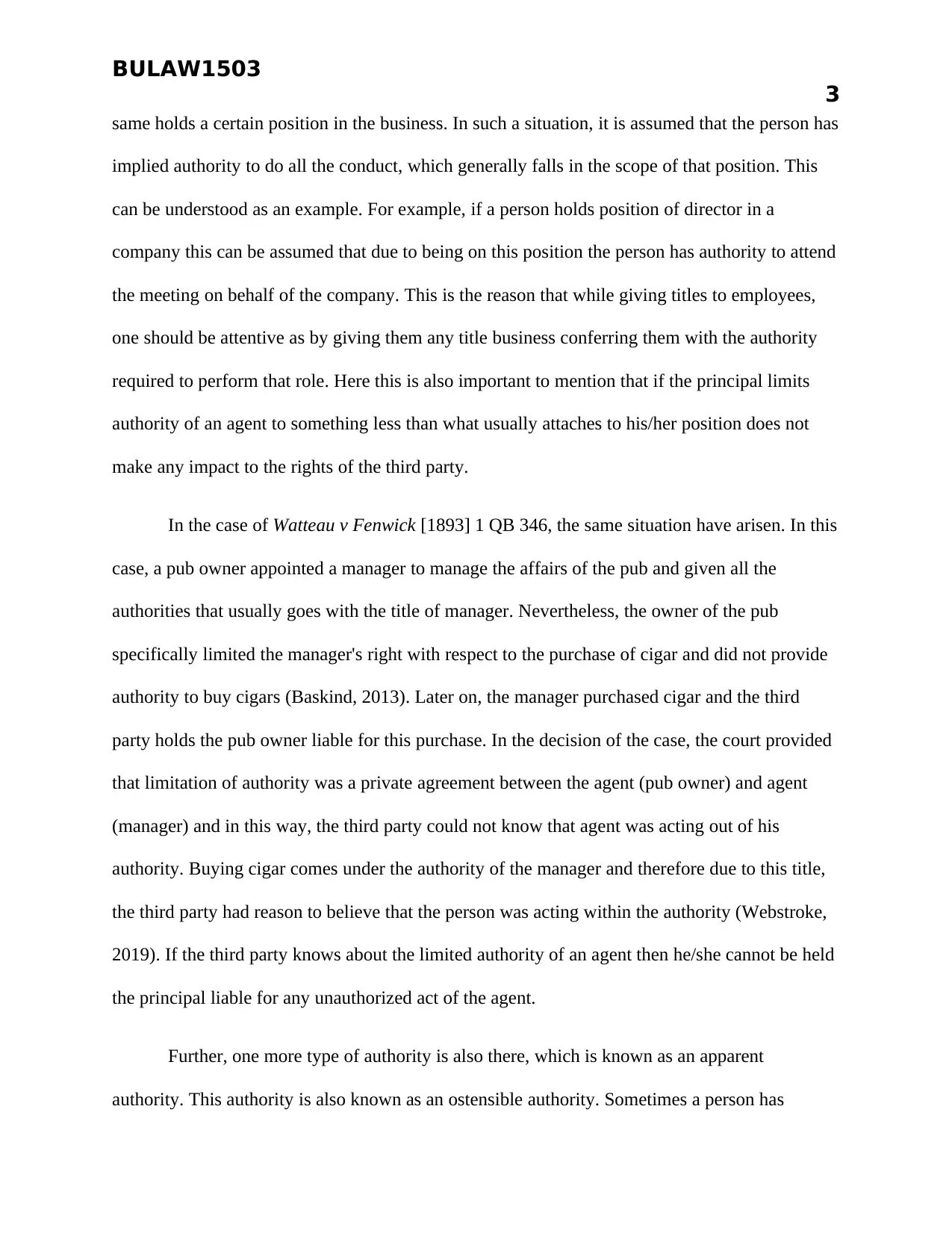
BULAW1503
3
same holds a certain position in the business. In such a situation, it is assumed that the person has
implied authority to do all the conduct, which generally falls in the scope of that position. This
can be understood as an example. For example, if a person holds position of director in a
company this can be assumed that due to being on this position the person has authority to attend
the meeting on behalf of the company. This is the reason that while giving titles to employees,
one should be attentive as by giving them any title business conferring them with the authority
required to perform that role. Here this is also important to mention that if the principal limits
authority of an agent to something less than what usually attaches to his/her position does not
make any impact to the rights of the third party.
In the case of Watteau v Fenwick [1893] 1 QB 346, the same situation have arisen. In this
case, a pub owner appointed a manager to manage the affairs of the pub and given all the
authorities that usually goes with the title of manager. Nevertheless, the owner of the pub
specifically limited the manager's right with respect to the purchase of cigar and did not provide
authority to buy cigars (Baskind, 2013). Later on, the manager purchased cigar and the third
party holds the pub owner liable for this purchase. In the decision of the case, the court provided
that limitation of authority was a private agreement between the agent (pub owner) and agent
(manager) and in this way, the third party could not know that agent was acting out of his
authority. Buying cigar comes under the authority of the manager and therefore due to this title,
the third party had reason to believe that the person was acting within the authority (Webstroke,
2019). If the third party knows about the limited authority of an agent then he/she cannot be held
the principal liable for any unauthorized act of the agent.
Further, one more type of authority is also there, which is known as an apparent
authority. This authority is also known as an ostensible authority. Sometimes a person has
3
same holds a certain position in the business. In such a situation, it is assumed that the person has
implied authority to do all the conduct, which generally falls in the scope of that position. This
can be understood as an example. For example, if a person holds position of director in a
company this can be assumed that due to being on this position the person has authority to attend
the meeting on behalf of the company. This is the reason that while giving titles to employees,
one should be attentive as by giving them any title business conferring them with the authority
required to perform that role. Here this is also important to mention that if the principal limits
authority of an agent to something less than what usually attaches to his/her position does not
make any impact to the rights of the third party.
In the case of Watteau v Fenwick [1893] 1 QB 346, the same situation have arisen. In this
case, a pub owner appointed a manager to manage the affairs of the pub and given all the
authorities that usually goes with the title of manager. Nevertheless, the owner of the pub
specifically limited the manager's right with respect to the purchase of cigar and did not provide
authority to buy cigars (Baskind, 2013). Later on, the manager purchased cigar and the third
party holds the pub owner liable for this purchase. In the decision of the case, the court provided
that limitation of authority was a private agreement between the agent (pub owner) and agent
(manager) and in this way, the third party could not know that agent was acting out of his
authority. Buying cigar comes under the authority of the manager and therefore due to this title,
the third party had reason to believe that the person was acting within the authority (Webstroke,
2019). If the third party knows about the limited authority of an agent then he/she cannot be held
the principal liable for any unauthorized act of the agent.
Further, one more type of authority is also there, which is known as an apparent
authority. This authority is also known as an ostensible authority. Sometimes a person has
Paraphrase This Document
Need a fresh take? Get an instant paraphrase of this document with our AI Paraphraser
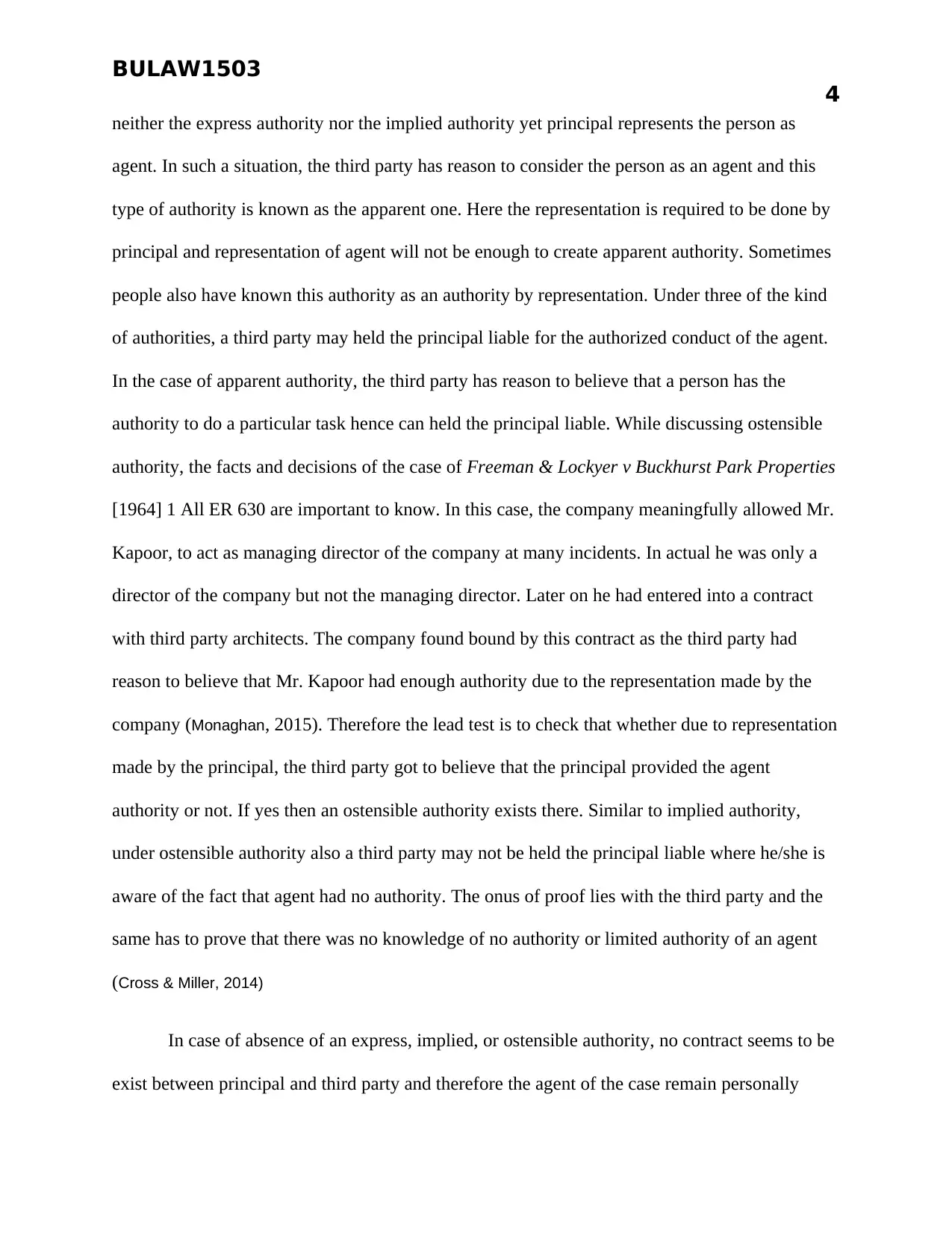
BULAW1503
4
neither the express authority nor the implied authority yet principal represents the person as
agent. In such a situation, the third party has reason to consider the person as an agent and this
type of authority is known as the apparent one. Here the representation is required to be done by
principal and representation of agent will not be enough to create apparent authority. Sometimes
people also have known this authority as an authority by representation. Under three of the kind
of authorities, a third party may held the principal liable for the authorized conduct of the agent.
In the case of apparent authority, the third party has reason to believe that a person has the
authority to do a particular task hence can held the principal liable. While discussing ostensible
authority, the facts and decisions of the case of Freeman & Lockyer v Buckhurst Park Properties
[1964] 1 All ER 630 are important to know. In this case, the company meaningfully allowed Mr.
Kapoor, to act as managing director of the company at many incidents. In actual he was only a
director of the company but not the managing director. Later on he had entered into a contract
with third party architects. The company found bound by this contract as the third party had
reason to believe that Mr. Kapoor had enough authority due to the representation made by the
company (Monaghan, 2015). Therefore the lead test is to check that whether due to representation
made by the principal, the third party got to believe that the principal provided the agent
authority or not. If yes then an ostensible authority exists there. Similar to implied authority,
under ostensible authority also a third party may not be held the principal liable where he/she is
aware of the fact that agent had no authority. The onus of proof lies with the third party and the
same has to prove that there was no knowledge of no authority or limited authority of an agent
(Cross & Miller, 2014)
In case of absence of an express, implied, or ostensible authority, no contract seems to be
exist between principal and third party and therefore the agent of the case remain personally
4
neither the express authority nor the implied authority yet principal represents the person as
agent. In such a situation, the third party has reason to consider the person as an agent and this
type of authority is known as the apparent one. Here the representation is required to be done by
principal and representation of agent will not be enough to create apparent authority. Sometimes
people also have known this authority as an authority by representation. Under three of the kind
of authorities, a third party may held the principal liable for the authorized conduct of the agent.
In the case of apparent authority, the third party has reason to believe that a person has the
authority to do a particular task hence can held the principal liable. While discussing ostensible
authority, the facts and decisions of the case of Freeman & Lockyer v Buckhurst Park Properties
[1964] 1 All ER 630 are important to know. In this case, the company meaningfully allowed Mr.
Kapoor, to act as managing director of the company at many incidents. In actual he was only a
director of the company but not the managing director. Later on he had entered into a contract
with third party architects. The company found bound by this contract as the third party had
reason to believe that Mr. Kapoor had enough authority due to the representation made by the
company (Monaghan, 2015). Therefore the lead test is to check that whether due to representation
made by the principal, the third party got to believe that the principal provided the agent
authority or not. If yes then an ostensible authority exists there. Similar to implied authority,
under ostensible authority also a third party may not be held the principal liable where he/she is
aware of the fact that agent had no authority. The onus of proof lies with the third party and the
same has to prove that there was no knowledge of no authority or limited authority of an agent
(Cross & Miller, 2014)
In case of absence of an express, implied, or ostensible authority, no contract seems to be
exist between principal and third party and therefore the agent of the case remain personally
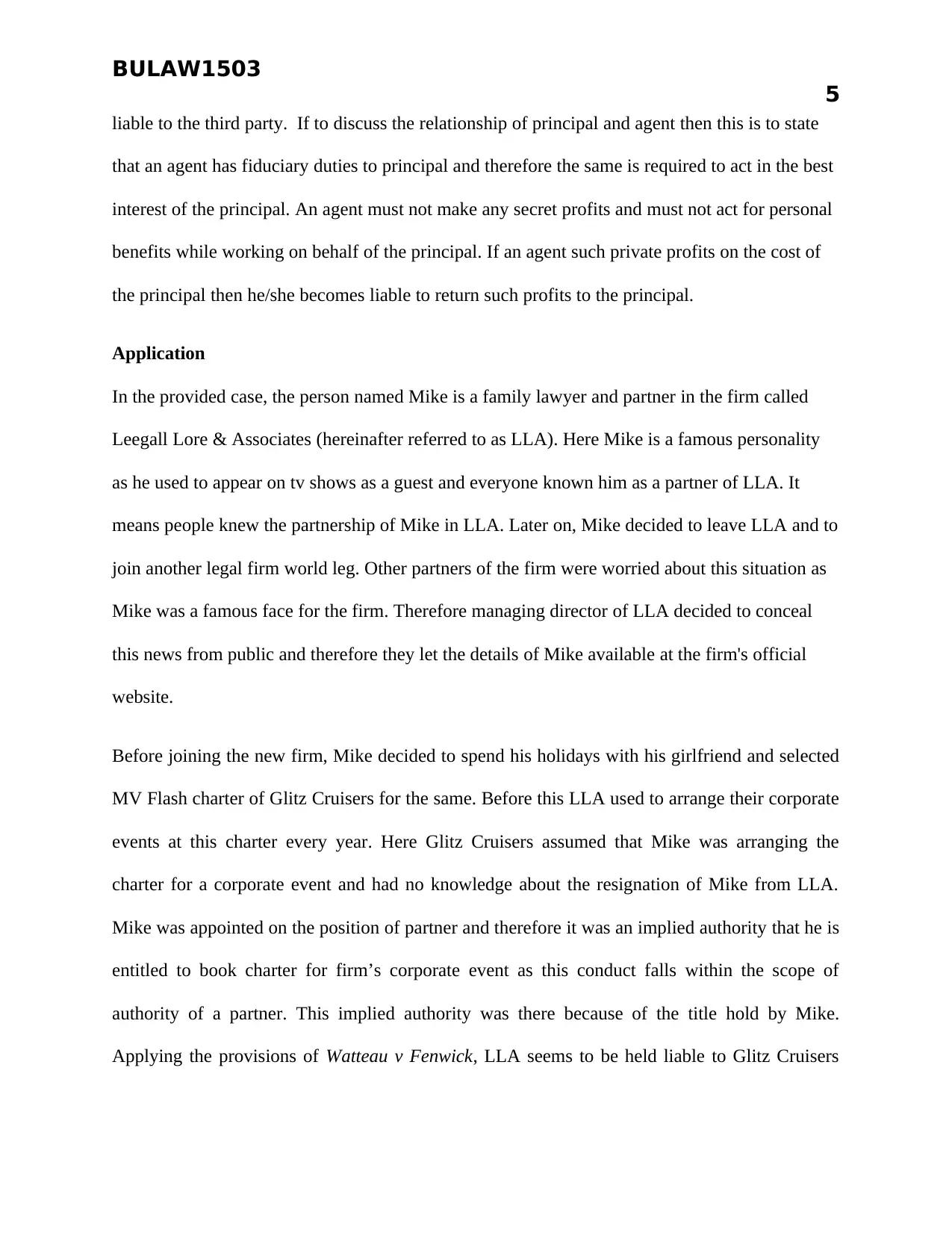
BULAW1503
5
liable to the third party. If to discuss the relationship of principal and agent then this is to state
that an agent has fiduciary duties to principal and therefore the same is required to act in the best
interest of the principal. An agent must not make any secret profits and must not act for personal
benefits while working on behalf of the principal. If an agent such private profits on the cost of
the principal then he/she becomes liable to return such profits to the principal.
Application
In the provided case, the person named Mike is a family lawyer and partner in the firm called
Leegall Lore & Associates (hereinafter referred to as LLA). Here Mike is a famous personality
as he used to appear on tv shows as a guest and everyone known him as a partner of LLA. It
means people knew the partnership of Mike in LLA. Later on, Mike decided to leave LLA and to
join another legal firm world leg. Other partners of the firm were worried about this situation as
Mike was a famous face for the firm. Therefore managing director of LLA decided to conceal
this news from public and therefore they let the details of Mike available at the firm's official
website.
Before joining the new firm, Mike decided to spend his holidays with his girlfriend and selected
MV Flash charter of Glitz Cruisers for the same. Before this LLA used to arrange their corporate
events at this charter every year. Here Glitz Cruisers assumed that Mike was arranging the
charter for a corporate event and had no knowledge about the resignation of Mike from LLA.
Mike was appointed on the position of partner and therefore it was an implied authority that he is
entitled to book charter for firm’s corporate event as this conduct falls within the scope of
authority of a partner. This implied authority was there because of the title hold by Mike.
Applying the provisions of Watteau v Fenwick, LLA seems to be held liable to Glitz Cruisers
5
liable to the third party. If to discuss the relationship of principal and agent then this is to state
that an agent has fiduciary duties to principal and therefore the same is required to act in the best
interest of the principal. An agent must not make any secret profits and must not act for personal
benefits while working on behalf of the principal. If an agent such private profits on the cost of
the principal then he/she becomes liable to return such profits to the principal.
Application
In the provided case, the person named Mike is a family lawyer and partner in the firm called
Leegall Lore & Associates (hereinafter referred to as LLA). Here Mike is a famous personality
as he used to appear on tv shows as a guest and everyone known him as a partner of LLA. It
means people knew the partnership of Mike in LLA. Later on, Mike decided to leave LLA and to
join another legal firm world leg. Other partners of the firm were worried about this situation as
Mike was a famous face for the firm. Therefore managing director of LLA decided to conceal
this news from public and therefore they let the details of Mike available at the firm's official
website.
Before joining the new firm, Mike decided to spend his holidays with his girlfriend and selected
MV Flash charter of Glitz Cruisers for the same. Before this LLA used to arrange their corporate
events at this charter every year. Here Glitz Cruisers assumed that Mike was arranging the
charter for a corporate event and had no knowledge about the resignation of Mike from LLA.
Mike was appointed on the position of partner and therefore it was an implied authority that he is
entitled to book charter for firm’s corporate event as this conduct falls within the scope of
authority of a partner. This implied authority was there because of the title hold by Mike.
Applying the provisions of Watteau v Fenwick, LLA seems to be held liable to Glitz Cruisers
⊘ This is a preview!⊘
Do you want full access?
Subscribe today to unlock all pages.

Trusted by 1+ million students worldwide
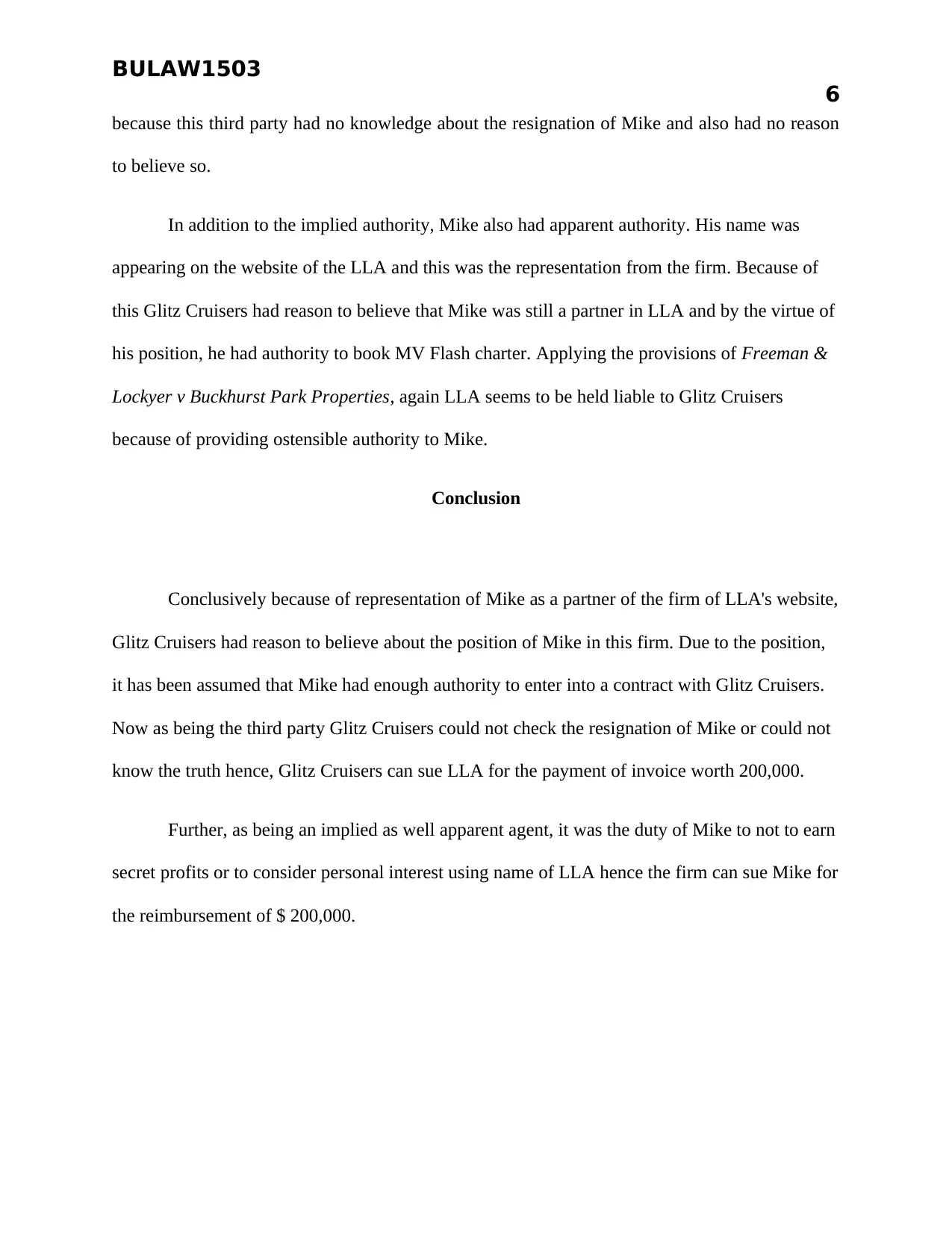
BULAW1503
6
because this third party had no knowledge about the resignation of Mike and also had no reason
to believe so.
In addition to the implied authority, Mike also had apparent authority. His name was
appearing on the website of the LLA and this was the representation from the firm. Because of
this Glitz Cruisers had reason to believe that Mike was still a partner in LLA and by the virtue of
his position, he had authority to book MV Flash charter. Applying the provisions of Freeman &
Lockyer v Buckhurst Park Properties, again LLA seems to be held liable to Glitz Cruisers
because of providing ostensible authority to Mike.
Conclusion
Conclusively because of representation of Mike as a partner of the firm of LLA's website,
Glitz Cruisers had reason to believe about the position of Mike in this firm. Due to the position,
it has been assumed that Mike had enough authority to enter into a contract with Glitz Cruisers.
Now as being the third party Glitz Cruisers could not check the resignation of Mike or could not
know the truth hence, Glitz Cruisers can sue LLA for the payment of invoice worth 200,000.
Further, as being an implied as well apparent agent, it was the duty of Mike to not to earn
secret profits or to consider personal interest using name of LLA hence the firm can sue Mike for
the reimbursement of $ 200,000.
6
because this third party had no knowledge about the resignation of Mike and also had no reason
to believe so.
In addition to the implied authority, Mike also had apparent authority. His name was
appearing on the website of the LLA and this was the representation from the firm. Because of
this Glitz Cruisers had reason to believe that Mike was still a partner in LLA and by the virtue of
his position, he had authority to book MV Flash charter. Applying the provisions of Freeman &
Lockyer v Buckhurst Park Properties, again LLA seems to be held liable to Glitz Cruisers
because of providing ostensible authority to Mike.
Conclusion
Conclusively because of representation of Mike as a partner of the firm of LLA's website,
Glitz Cruisers had reason to believe about the position of Mike in this firm. Due to the position,
it has been assumed that Mike had enough authority to enter into a contract with Glitz Cruisers.
Now as being the third party Glitz Cruisers could not check the resignation of Mike or could not
know the truth hence, Glitz Cruisers can sue LLA for the payment of invoice worth 200,000.
Further, as being an implied as well apparent agent, it was the duty of Mike to not to earn
secret profits or to consider personal interest using name of LLA hence the firm can sue Mike for
the reimbursement of $ 200,000.
Paraphrase This Document
Need a fresh take? Get an instant paraphrase of this document with our AI Paraphraser
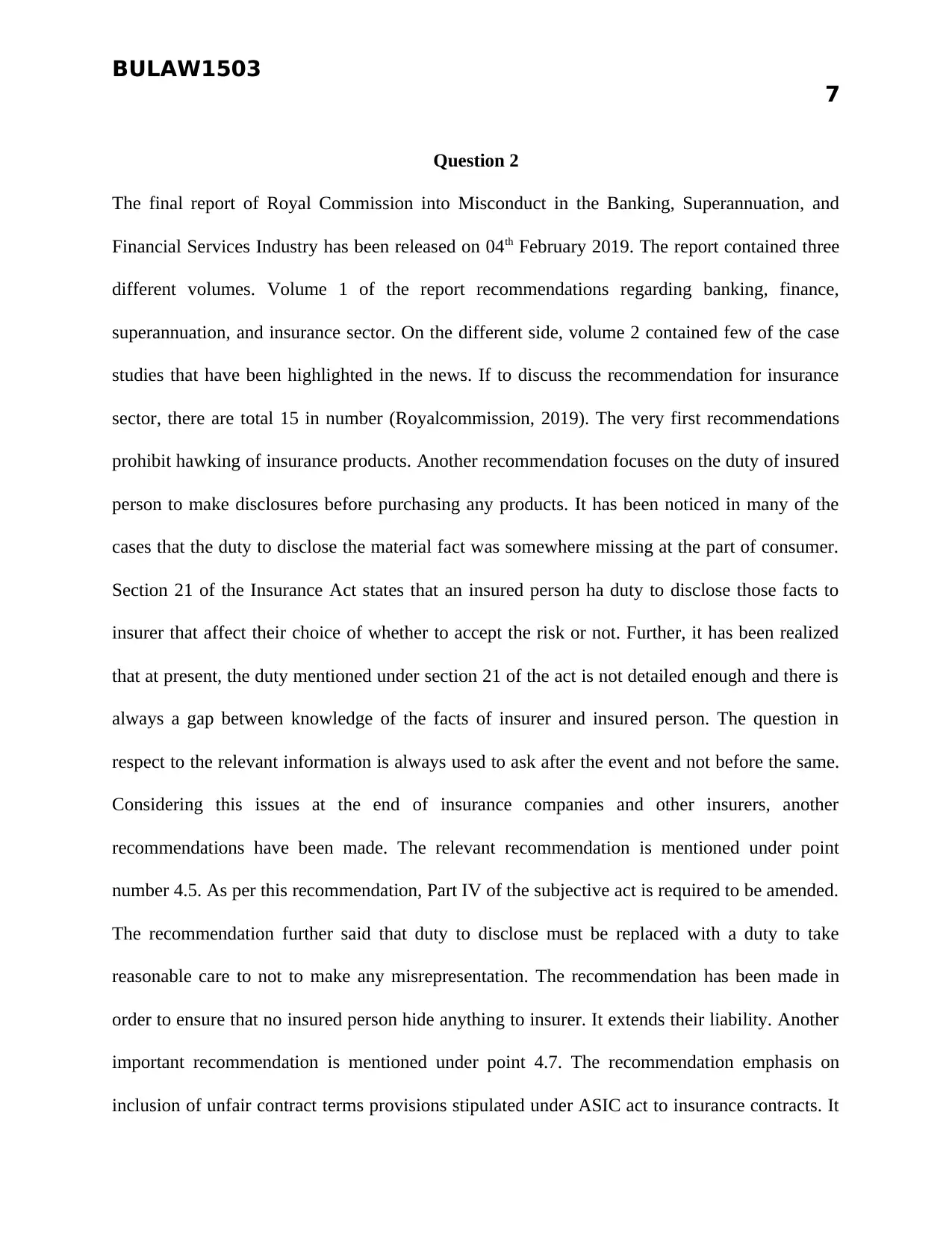
BULAW1503
7
Question 2
The final report of Royal Commission into Misconduct in the Banking, Superannuation, and
Financial Services Industry has been released on 04th February 2019. The report contained three
different volumes. Volume 1 of the report recommendations regarding banking, finance,
superannuation, and insurance sector. On the different side, volume 2 contained few of the case
studies that have been highlighted in the news. If to discuss the recommendation for insurance
sector, there are total 15 in number (Royalcommission, 2019). The very first recommendations
prohibit hawking of insurance products. Another recommendation focuses on the duty of insured
person to make disclosures before purchasing any products. It has been noticed in many of the
cases that the duty to disclose the material fact was somewhere missing at the part of consumer.
Section 21 of the Insurance Act states that an insured person ha duty to disclose those facts to
insurer that affect their choice of whether to accept the risk or not. Further, it has been realized
that at present, the duty mentioned under section 21 of the act is not detailed enough and there is
always a gap between knowledge of the facts of insurer and insured person. The question in
respect to the relevant information is always used to ask after the event and not before the same.
Considering this issues at the end of insurance companies and other insurers, another
recommendations have been made. The relevant recommendation is mentioned under point
number 4.5. As per this recommendation, Part IV of the subjective act is required to be amended.
The recommendation further said that duty to disclose must be replaced with a duty to take
reasonable care to not to make any misrepresentation. The recommendation has been made in
order to ensure that no insured person hide anything to insurer. It extends their liability. Another
important recommendation is mentioned under point 4.7. The recommendation emphasis on
inclusion of unfair contract terms provisions stipulated under ASIC act to insurance contracts. It
7
Question 2
The final report of Royal Commission into Misconduct in the Banking, Superannuation, and
Financial Services Industry has been released on 04th February 2019. The report contained three
different volumes. Volume 1 of the report recommendations regarding banking, finance,
superannuation, and insurance sector. On the different side, volume 2 contained few of the case
studies that have been highlighted in the news. If to discuss the recommendation for insurance
sector, there are total 15 in number (Royalcommission, 2019). The very first recommendations
prohibit hawking of insurance products. Another recommendation focuses on the duty of insured
person to make disclosures before purchasing any products. It has been noticed in many of the
cases that the duty to disclose the material fact was somewhere missing at the part of consumer.
Section 21 of the Insurance Act states that an insured person ha duty to disclose those facts to
insurer that affect their choice of whether to accept the risk or not. Further, it has been realized
that at present, the duty mentioned under section 21 of the act is not detailed enough and there is
always a gap between knowledge of the facts of insurer and insured person. The question in
respect to the relevant information is always used to ask after the event and not before the same.
Considering this issues at the end of insurance companies and other insurers, another
recommendations have been made. The relevant recommendation is mentioned under point
number 4.5. As per this recommendation, Part IV of the subjective act is required to be amended.
The recommendation further said that duty to disclose must be replaced with a duty to take
reasonable care to not to make any misrepresentation. The recommendation has been made in
order to ensure that no insured person hide anything to insurer. It extends their liability. Another
important recommendation is mentioned under point 4.7. The recommendation emphasis on
inclusion of unfair contract terms provisions stipulated under ASIC act to insurance contracts. It
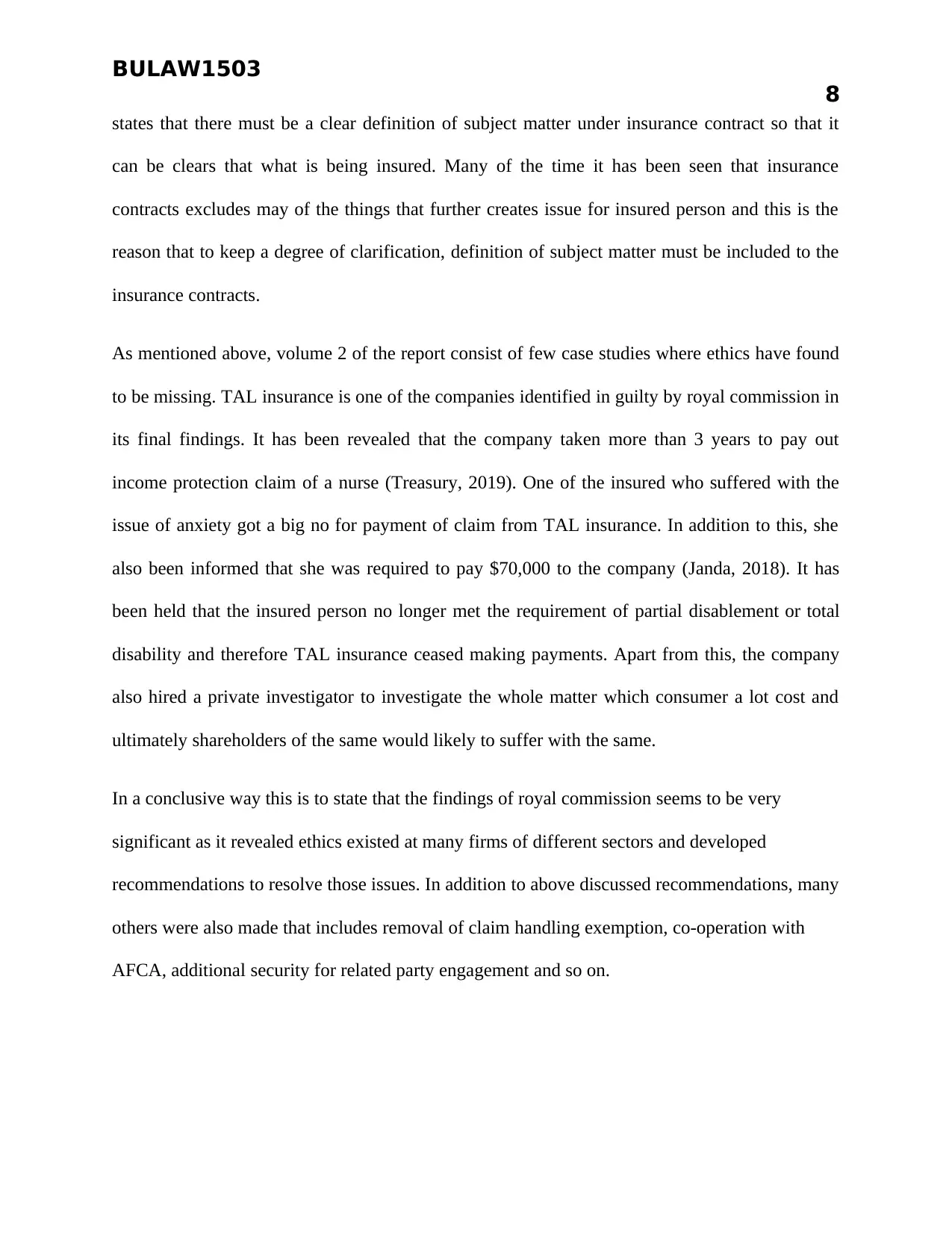
BULAW1503
8
states that there must be a clear definition of subject matter under insurance contract so that it
can be clears that what is being insured. Many of the time it has been seen that insurance
contracts excludes may of the things that further creates issue for insured person and this is the
reason that to keep a degree of clarification, definition of subject matter must be included to the
insurance contracts.
As mentioned above, volume 2 of the report consist of few case studies where ethics have found
to be missing. TAL insurance is one of the companies identified in guilty by royal commission in
its final findings. It has been revealed that the company taken more than 3 years to pay out
income protection claim of a nurse (Treasury, 2019). One of the insured who suffered with the
issue of anxiety got a big no for payment of claim from TAL insurance. In addition to this, she
also been informed that she was required to pay $70,000 to the company (Janda, 2018). It has
been held that the insured person no longer met the requirement of partial disablement or total
disability and therefore TAL insurance ceased making payments. Apart from this, the company
also hired a private investigator to investigate the whole matter which consumer a lot cost and
ultimately shareholders of the same would likely to suffer with the same.
In a conclusive way this is to state that the findings of royal commission seems to be very
significant as it revealed ethics existed at many firms of different sectors and developed
recommendations to resolve those issues. In addition to above discussed recommendations, many
others were also made that includes removal of claim handling exemption, co-operation with
AFCA, additional security for related party engagement and so on.
8
states that there must be a clear definition of subject matter under insurance contract so that it
can be clears that what is being insured. Many of the time it has been seen that insurance
contracts excludes may of the things that further creates issue for insured person and this is the
reason that to keep a degree of clarification, definition of subject matter must be included to the
insurance contracts.
As mentioned above, volume 2 of the report consist of few case studies where ethics have found
to be missing. TAL insurance is one of the companies identified in guilty by royal commission in
its final findings. It has been revealed that the company taken more than 3 years to pay out
income protection claim of a nurse (Treasury, 2019). One of the insured who suffered with the
issue of anxiety got a big no for payment of claim from TAL insurance. In addition to this, she
also been informed that she was required to pay $70,000 to the company (Janda, 2018). It has
been held that the insured person no longer met the requirement of partial disablement or total
disability and therefore TAL insurance ceased making payments. Apart from this, the company
also hired a private investigator to investigate the whole matter which consumer a lot cost and
ultimately shareholders of the same would likely to suffer with the same.
In a conclusive way this is to state that the findings of royal commission seems to be very
significant as it revealed ethics existed at many firms of different sectors and developed
recommendations to resolve those issues. In addition to above discussed recommendations, many
others were also made that includes removal of claim handling exemption, co-operation with
AFCA, additional security for related party engagement and so on.
⊘ This is a preview!⊘
Do you want full access?
Subscribe today to unlock all pages.

Trusted by 1+ million students worldwide
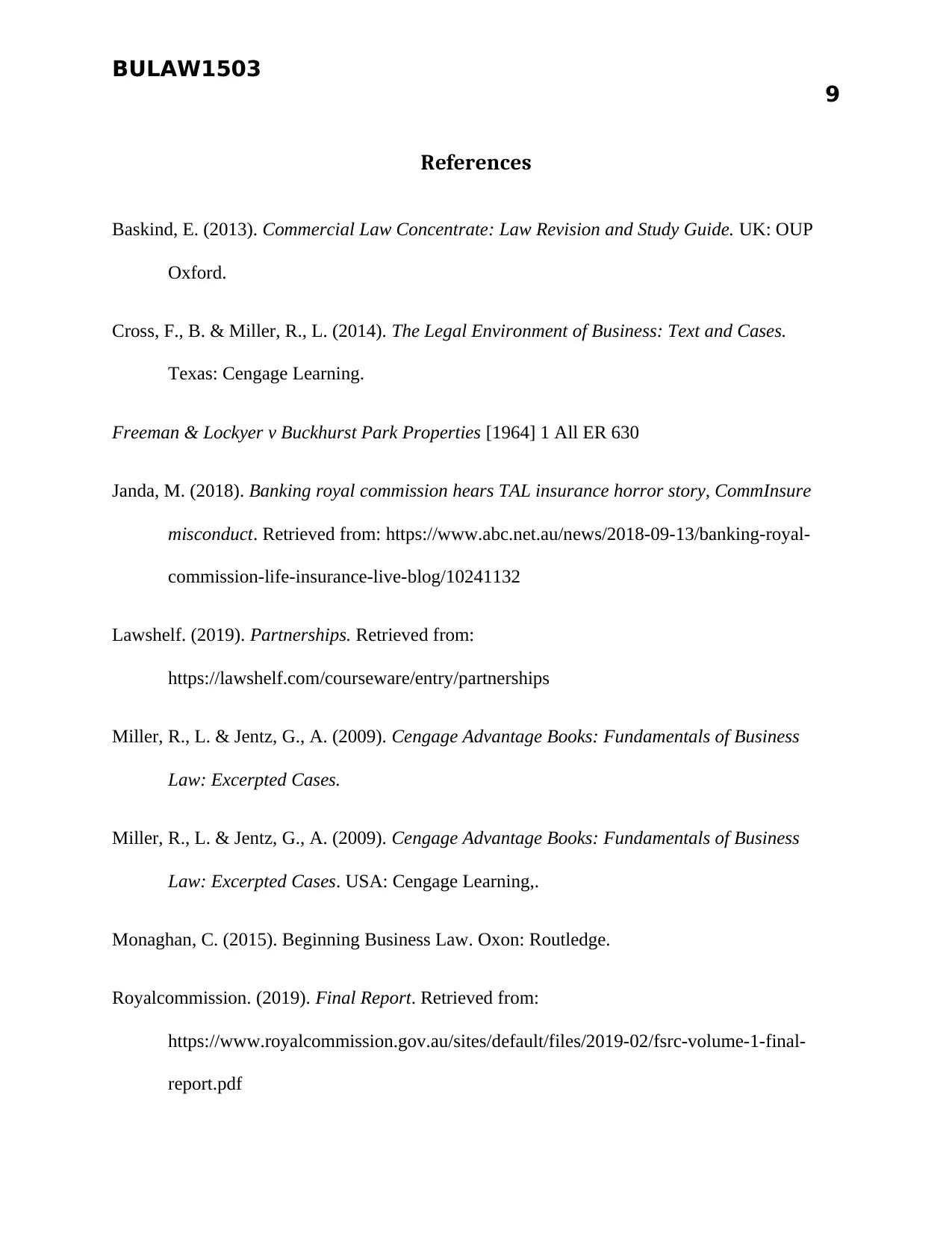
BULAW1503
9
References
Baskind, E. (2013). Commercial Law Concentrate: Law Revision and Study Guide. UK: OUP
Oxford.
Cross, F., B. & Miller, R., L. (2014). The Legal Environment of Business: Text and Cases.
Texas: Cengage Learning.
Freeman & Lockyer v Buckhurst Park Properties [1964] 1 All ER 630
Janda, M. (2018). Banking royal commission hears TAL insurance horror story, CommInsure
misconduct. Retrieved from: https://www.abc.net.au/news/2018-09-13/banking-royal-
commission-life-insurance-live-blog/10241132
Lawshelf. (2019). Partnerships. Retrieved from:
https://lawshelf.com/courseware/entry/partnerships
Miller, R., L. & Jentz, G., A. (2009). Cengage Advantage Books: Fundamentals of Business
Law: Excerpted Cases.
Miller, R., L. & Jentz, G., A. (2009). Cengage Advantage Books: Fundamentals of Business
Law: Excerpted Cases. USA: Cengage Learning,.
Monaghan, C. (2015). Beginning Business Law. Oxon: Routledge.
Royalcommission. (2019). Final Report. Retrieved from:
https://www.royalcommission.gov.au/sites/default/files/2019-02/fsrc-volume-1-final-
report.pdf
9
References
Baskind, E. (2013). Commercial Law Concentrate: Law Revision and Study Guide. UK: OUP
Oxford.
Cross, F., B. & Miller, R., L. (2014). The Legal Environment of Business: Text and Cases.
Texas: Cengage Learning.
Freeman & Lockyer v Buckhurst Park Properties [1964] 1 All ER 630
Janda, M. (2018). Banking royal commission hears TAL insurance horror story, CommInsure
misconduct. Retrieved from: https://www.abc.net.au/news/2018-09-13/banking-royal-
commission-life-insurance-live-blog/10241132
Lawshelf. (2019). Partnerships. Retrieved from:
https://lawshelf.com/courseware/entry/partnerships
Miller, R., L. & Jentz, G., A. (2009). Cengage Advantage Books: Fundamentals of Business
Law: Excerpted Cases.
Miller, R., L. & Jentz, G., A. (2009). Cengage Advantage Books: Fundamentals of Business
Law: Excerpted Cases. USA: Cengage Learning,.
Monaghan, C. (2015). Beginning Business Law. Oxon: Routledge.
Royalcommission. (2019). Final Report. Retrieved from:
https://www.royalcommission.gov.au/sites/default/files/2019-02/fsrc-volume-1-final-
report.pdf
Paraphrase This Document
Need a fresh take? Get an instant paraphrase of this document with our AI Paraphraser
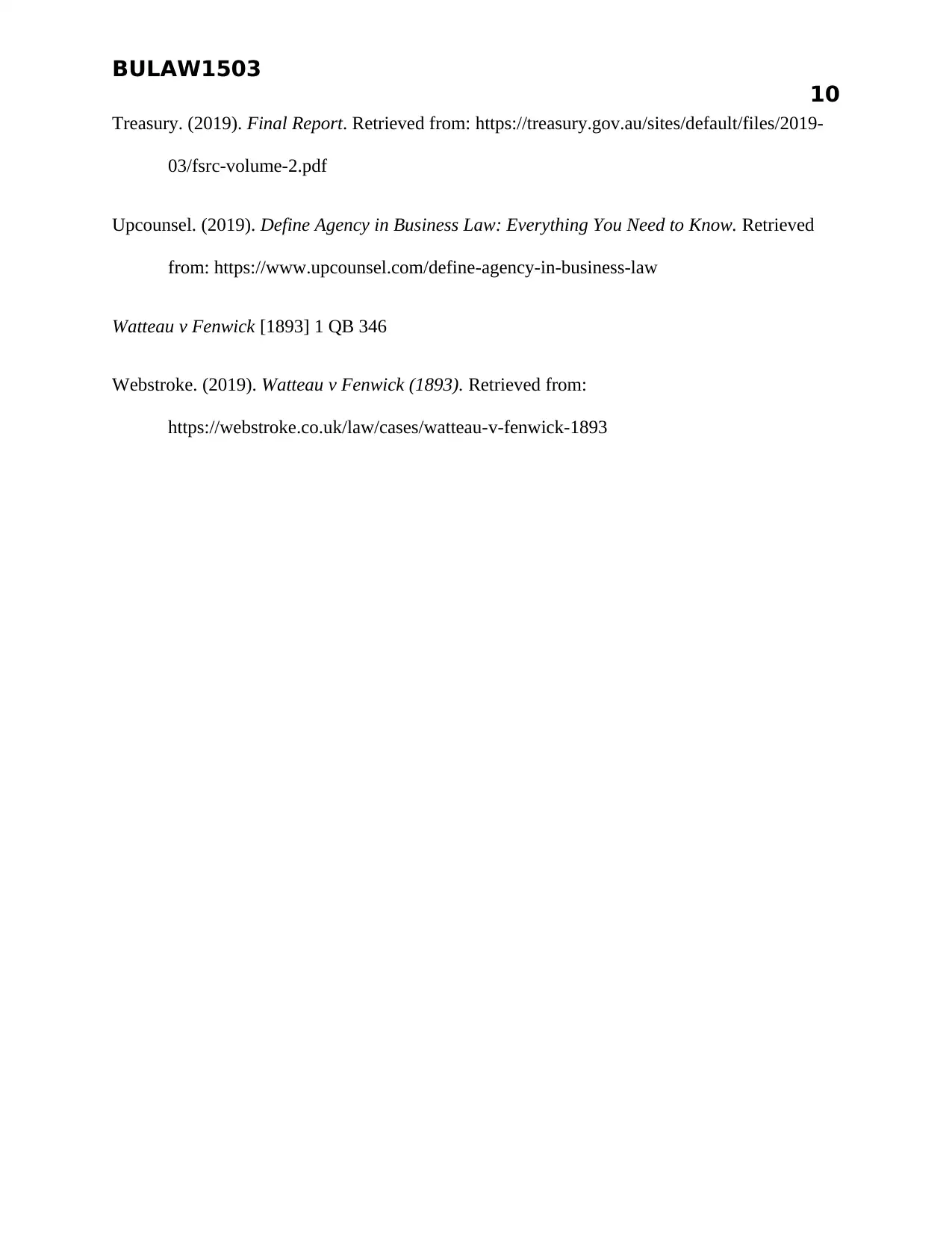
BULAW1503
10
Treasury. (2019). Final Report. Retrieved from: https://treasury.gov.au/sites/default/files/2019-
03/fsrc-volume-2.pdf
Upcounsel. (2019). Define Agency in Business Law: Everything You Need to Know. Retrieved
from: https://www.upcounsel.com/define-agency-in-business-law
Watteau v Fenwick [1893] 1 QB 346
Webstroke. (2019). Watteau v Fenwick (1893). Retrieved from:
https://webstroke.co.uk/law/cases/watteau-v-fenwick-1893
10
Treasury. (2019). Final Report. Retrieved from: https://treasury.gov.au/sites/default/files/2019-
03/fsrc-volume-2.pdf
Upcounsel. (2019). Define Agency in Business Law: Everything You Need to Know. Retrieved
from: https://www.upcounsel.com/define-agency-in-business-law
Watteau v Fenwick [1893] 1 QB 346
Webstroke. (2019). Watteau v Fenwick (1893). Retrieved from:
https://webstroke.co.uk/law/cases/watteau-v-fenwick-1893
1 out of 11
Related Documents
Your All-in-One AI-Powered Toolkit for Academic Success.
+13062052269
info@desklib.com
Available 24*7 on WhatsApp / Email
![[object Object]](/_next/static/media/star-bottom.7253800d.svg)
Unlock your academic potential
Copyright © 2020–2026 A2Z Services. All Rights Reserved. Developed and managed by ZUCOL.





